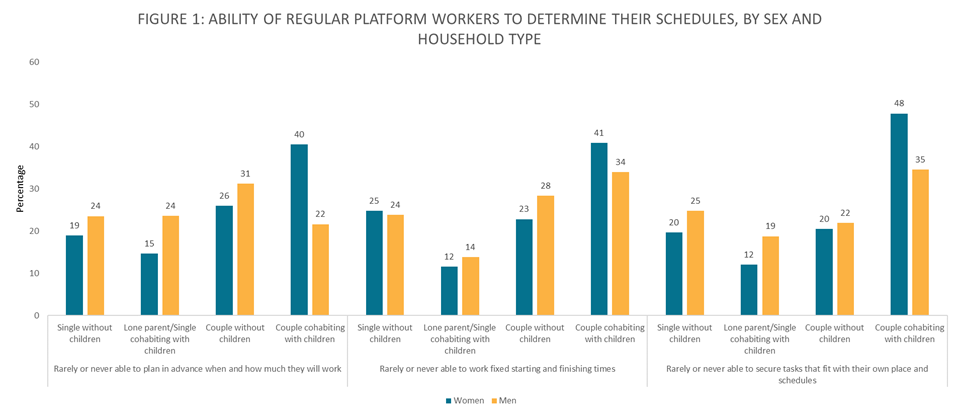Increasing digitalisation has led to a proliferation of so-called "platform work" whereby workers use online platforms (e.g. Uber, Wolt, Bolt) to access clients to deliver specific tasks or services. Such platforms can be seen to offer flexibility regarding when, how much and where one works. And this can contribute to gender equality through enabling a better work-life balance.
For example, allowing people with childcare responsibilities, who are predominantly women, to fit work in around school hours, potentially increasing their participation in the labour market.
EIGE’s survey of platform workers in 10 Member States (DK, ES, FR, LV, NL, PL, RO, SI, SK, FI) conducted in November and December 2020, found that 35% of women platform workers were drawn to this style of work because of family commitments, compared to 28% of men. Yet their experiences indicate that the anticipated flexibility is not always delivered in practice.
Of regular platform workers, i.e. those who had worked on digital platforms at least occasionally in the past six months, approximately a third experienced difficulties determining their schedules. These difficulties were slightly more commonly experienced by men than women with, for example, 30% of men reporting they can rarely or never secure tasks according to their plans or schedules, compared to 22% of women.
Women cohabiting with a partner and children are less likely to benefit from the flexibility of platform work (see Figure 1); Such women are almost twice as likely than men to report being rarely or never able to advance their tasks (40 % and 22 % respectively).
A similar pattern emerges regarding their ability to secure tasks that fit their needs, where such women are more likely to never or rarely being able to do so than men (48% and 35% respectively). Regarding the ability of women and men cohabiting with children to have fixed starting and finishing time, the gender gap is slightly smaller (41% of women, compared to 34% of men).
Moreover, platform workers may experience challenges with scheduling their work because it is often performed outside the regular working day, though more often by men than by women. As many as 36 % of women and 40 % of men who regularly work via platforms often or always work nights and/or weekends.

Flexible working can be particularly important for women and men who perform high levels of household work, childcare or care for disabled, elderly or infirm persons. Just over half of platform workers live in a household with children either as single parents or as a couple (59% of women and 53% of men).
Although the surveyed women and men on average spent the same number of hours working in both a job outside platform work and doing platform work, women on average spent about 2.5 hours per week more than men on household work and 3.5 hours more on childcare. This shows that although men and women have similar paid work responsibilities, household responsibilities are not equally distributed.
The differences are even greater in couples with children – surveyed women who live with their partner and children spent, on average, 6 hours more per week on childcare (17 hours for women and 11 for men).
Women’s higher unpaid care responsibilities impact the scheduling of their work on online platforms. As shown by Figure 2 there is a 12 percentage point difference between women and men reporting both household chores and caring for children as a factor affecting their time spent doing platform work.
Childcare and household chores are a particularly important factor influencing women in couples with children: 46% of women mentioned household chores as determining their working time and schedule compared to only 34% of men (see Figure 2).

A similar gap applies regarding care for and education of children (32% and 20% respectively). Here, there is a particular gender gap among women and men cohabiting with a partner where 55% of women report caring for children as a factor in their scheduling, compared to 39% of men.
Overall, the promise of flexible work is not fully realised in practice as a third of all platform workers report challenges determining their schedule and men report slightly more challenges than women in this regard. This inflexibility does not appear to have gendered implications on how much platform work women do, as it is equal to men.
The implications are instead felt in when women work; because women spend more time on childcare and household responsibilities, they face more challenges scheduling their work on digital platforms and have to factor in their unpaid work more than men.